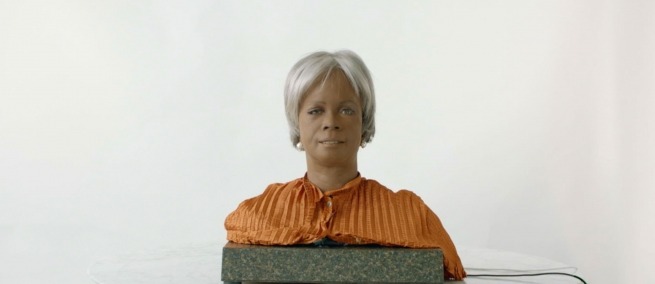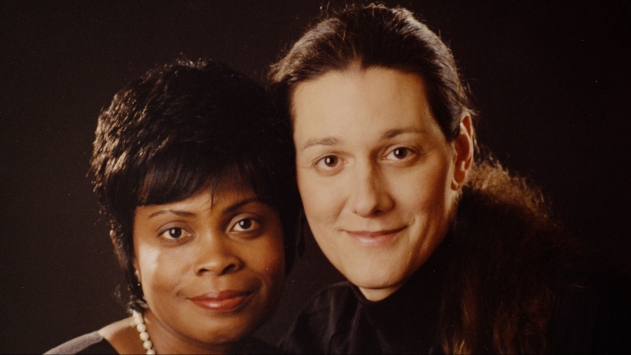
Making its world premiere at the 2024 Sundance Film Festival, in the U.S. Documentary Competition, LOVE MACHINA tells the story of Bina and Martine Rothblatt, who created a robotic artificial intelligence named BINA48 based off of Bina—the first such invention based on a living human. The film explores Martine and Bina’s relationship, and the love, engineering, and sci-fi stories that inspired their creation. We spoke with director and producer Peter Sillen right before the world premiere on January 19 in Park City.
Science & Film: I'm excited to talk to you, what a fun film.
Peter Sillen: I'm glad you thought so. There's a lot of tech in the film, but we wanted it to be a fun ride. We didn't want it to be this talking head--I mean, there are a lot of talking heads--but we wanted it to be to have some energy and to have something that was dynamic and kind of propelled you through.
S&F: Totally. I mean, talking head takes on a new meaning after watching the film... [laughs]
PS: We tried to lean into the love story and the humanistic elements of AI, and what's motivating some of what they're doing in the world.
S&F: I've heard about Bina and saw the film SOPHIA about the robotics company that constructed BINA48.
PS: When we were there shooting, that was the first day they were shooting. One of the DPs was there, flying solo. Two film crews show up the same day, everybody's looking at each other, like, what? But it was it was cool. It all worked fine.
S&F: So I knew about Bina, but I really did not know about Martine, about their relationship and about her seemingly superhuman capabilities.
PS: There's definitely an element of Marbina–them [Martine and Bina] together–of, if they're not on your radar, and then you learn about them, it's like, how did I not know about these people? They're doing such amazing, extraordinary things. Sometimes it's hard to believe that they're under the radar.

Bina Rothblatt and Martine Rothblatt in LOVE MACHINA. Courtesy of Sundance Institute.
S&F: Having spent time with them, do you get the impression that they are under the radar, or are trying to be?
PS: No, I don't mean to say they're under the radar by any design or anything. I think they're just normal people living their lives and doing kind of extraordinary things. In 2014, Martine published the book Virtually Human. A lot of the press that you see out there is basically from that time period, and it continues, but there's a normal ebb and flow to it.
S&F: What was your interest in the story to begin with?
PS: My producing partner, Brendan Doyle, and I, we got an email from a friend who had talked about an AI that was going to college. It was going to be the first AI to take a college class. We quickly did a little research and we saw that Martine and Bina were behind it. Not knowing much about any of it, we just thought, this could be really interesting. So, we jumped in. It started following BINA48 in this college class of Philosophy of Love, and then, immediately, the philosophy of love starts to open up the conversation to BINA48 and how she was created, and it just started expanding.
There were a couple of years where we had to earn Bina and Martine's trust. At some point, we crossed a threshold where they were okay with us. We showed them a first cut and I think they felt like we were really serious about what we were doing and were trying to document this in a legit way. Slowly, we started having more and more access, and then the film started to evolve.
S&F: Did you feel intimidated making a film about AI?
PS: In the beginning it was intimidating. I was reading books and listening to books, articles, it was nonstop. Every waking hour I was trying to figure out what is AI, what are these large language models, neural networks. And a lot of Martine and Bina's inspiration comes from the science fiction world and Octavia Butler. I had this bizarre duality of trying to read these science books about Marvin Minsky and AI, and the other side of it, which is the sci-fi side of it. At some point, you just become saturated with all this stuff, and then you're kind of looking at what's in front of you. That was, in some ways, liberating; just sticking with what we were shooting.
The trajectory of the public perception of AI from 2017 to now has been pretty incredible to see. I think we've been really fortunate to be able to be in that wave of having it in the foreground of the public's thought. For a long time with BINA48, we were dealing with technology that was kind of older. BINA48 in a lot of ways is a conversation starter. Martine and Bina were not ever pretending to be Deep Mind or Neuralink or anything like that. It was really this idea of getting audiences to start talking about STEAM and STEM education and trying to push the boundaries and engage people. But then when Chat GPT came around, all of a sudden, when she [BINA48] got Chat GPT layered in, it just was, it was like... Martine used to talk about the mind files and this idea of "mindware." Somewhere in the future, they're going to start creating software, which would animate your mind file [she said]. It was a little hard to grasp when she was talking about it. It was sort of like pie in the sky, in the future, 20 years away. And then all of a sudden, boom, it's here, you're using it. And then we're putting it in BINA48. It's another level of what we're talking about. We were really, really fortunate that we were able to capture that. It's one thing to talk about, it's another thing to see it.
S&F: As you were exploring the more technical side of things, were there any people or readings that were useful?
PS: A number of books were really good. That Cade Metz book that came out a couple years ago was great. Martine's book was, for me, really interesting. It's very technical. It's written in almost legalese—she is a lawyer. What I really got from it, and that I think is the important message in the film maybe, is that all this technology and AI in general are really just mirrors on our society of what we want to create. I think Stephanie Dinkins says it very well: how are we supposed to get that right if we haven't even gotten basic civil rights right? It's moving quickly, and it's something that we have to engage in. Hopefully, that's some of the dialogue that will start when you come out of the film.
S&F: Do you see BINA48 as a prototype for something that one day everyone will do? Do they see it that way?
PS: I think they're still working on the idea of mind files. You could go to LifeNaut today and start an account. It's really just a repository of everything that you want it to be, organizing your life and your thoughts. I don't want to speak for them, but I think the idea is that at some point, you will have options. You might literally want to have a biological body remade from your DNA—LifeNaut actually stores your DNA for $99. Or, it might be a hologram, or it might be some sort of avatar. I think robotics is probably going through the same revolution that a lot of the tech companies are, so maybe in a few years, that will be more of a realistic possibility. I don't know how realistic it is right now.
S&F: Have you started your LifeNaut file?
PS: I started one just to see what is going on that side of LifeNaut. I haven't really dived into it because I wanted to keep a distance. We're fans, but at the same time, we wanted to keep some objectivity.
♦
TOPICS